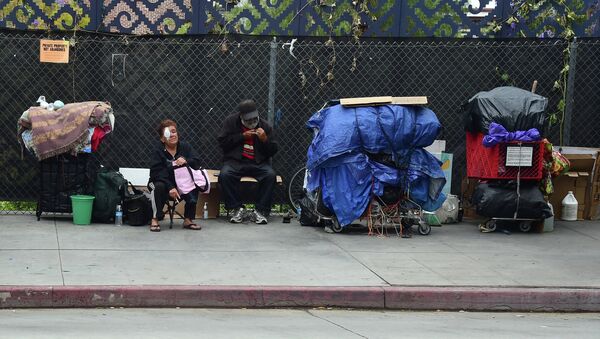The past year has marked the year of homelessness in the US as Los Angeles, Washington, D.C., and Seattle — America's most populated areas — hosted a huge jump in the number of people on the streets, according to the Hunger and Homelessness study. Washington, D.C. ranks first in the list of cities with homeless as figures say it has 28 percent more homeless and 60 percent more transient families. The demand for food for the hungry rose 27 percent over last year's.
The survey said that across twenty-two cities including Chicago, San Francisco, Philadelphia, and Baltimore, homelessness rose by 1.6 percent overall and handouts increased by 3 percent over the past year.
Chris Catarusa, 33, served with the US Marines in Iraq. This Christmas he's #homeless in USA https://t.co/dxxBjtijUU pic.twitter.com/Phc9SPlSQa
— James Oloo (@JamesAlanOLOO) December 28, 2015
Previously, low wages and high-priced housing have been mentioned by mayors of major American cities as the primary reasons for rising hunger and the increase in homeless flooding the streets. As a result, over the last year mass protests around the country have pushed for increases in wages as a way to eradicate poverty caused by low incomes that push people and families out of their homes.
Hunger in the US is now the highest since the 1930s, the era of the Great Depression as recent years have seen dramatic cuts to the food budget.
Nearly 60,000 people are sleeping in New York City shelters each night, including 23,000 children, according to the advocacy group Coalition for the Homeless. The cost of adult homeless shelters in New York City has surpassed $420 million per year, according to the New York City Mayor's Office, while annual state assistance only amounts to $69 million.
Major US Cities In States Of Emergency Over Homeless Crisis https://t.co/vaVQbXeeFz
— ✰DabStar420✰ (@DabStar420) December 28, 2015
Los Angeles, Hawaii, Portland, and Oregon have recently declared a state emergency to deal with their large homeless populations. The declarations mean increased funding for housing subsidies and shelters, as well as easing the way for building more affordable housing.




